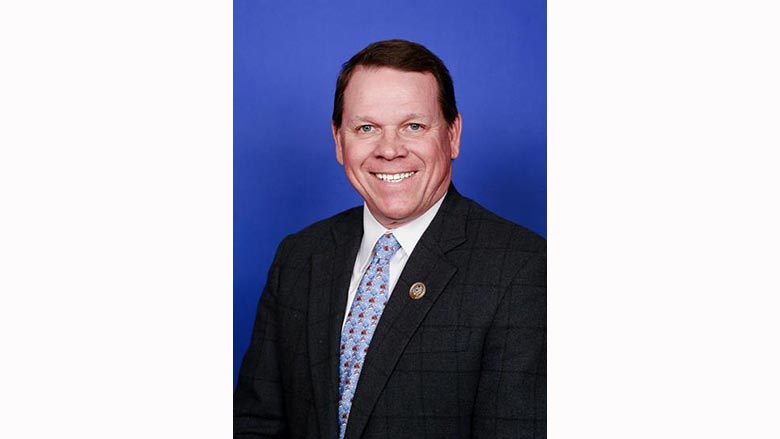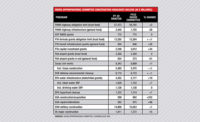With Rep. Kevin McCarthy (R-Calif.) having survived a turbulent series of votes to—narrowly—become Speaker of the House, the shape of the Republicans’ leadership ranks in the 118th Congress is coming into clearer focus, particularly with the selection of new House committee chairs.
Engineering and construction industry officials, as always, are paying particular attention to the House Transportation and Infrastructure Committee, where the panel’s senior GOP member, Rep. Sam Graves of Missouri, now has the gavel.
Panel jurisdiction includes most federal infrastructure programs, notably highways, aviation, transit, water resources and wastewater treatment. Graves has begun his 12th term in the House and from his long committee stint, he is a familiar face to industry officials.
Graves has moved quickly to outline his legislative priorities. In a Jan. 10 statement he said that a top agenda item will be drafting what he says is a bipartisan long-term reauthorization of Federal Aviation Administration programs, including the agency’s Airport Improvement Program (AIP) construction grants. The current FAA bill expires on Sept. 30. A failure to pass a new bill by that date could hurt the flow of funds.
Steve Hall, American Council of Engineering Cos. senior vice president for advocacy, said in an interview that for Graves, who is a pilot,”This is really an opportunity for him to have a legacy accomplishment."
Aviation issues have been thrust into the spotlight in recent weeks because of Southwest Airlines’ massive flight cancellations after yearend holiday storms and the FAA’s Jan. 11 system shutdown due to computer problems.
FAA Bill: Infrastructure Funds
But for engineering, construction and airport groups, a prime focus as the FAA bill lakes shape is how much funding it will have for AIP at a time when the new House majority is expected to take a tough line on nondefense spending.
In another key issue, airport groups and other infrastructure advocates will continue to push to raise the cap on passenger facility charges (PFCs), which has been limited to $4.50 per flight segment since 2000.
PFCs are an important airport construction resource, raising more than $2.5 billion in calendar 2021, the most recent FAA figures available.
The Associated General Contractors of America is among the groups supporting a higher cap. But Jimmy Christianson, AGC vice president-government relations, noted in an interview that major airlines have opposed changing the PFC cap, and says that the anti-cap campaign "faces an uphill battle in the current House atmosphere."
Other items on Graves' legislative list include a new pipeline safety measure and a Water Resources Development Act, to authorize more US Army Corps of Engineers civil works projects. But with a WRDA enacted late last year, a new one may not get a vote until 2024.
Focus on Oversight
As with other committees, transportation and infrastructure will aim for oversight of programs under its jurisdiction. "Number-one target," says Christianson, "every discretionary grant program at the U.S. Dept. of Transportation." That includes provisions that DOT has included to encourage including factors such as environmental justice, project labor agreements and local-hire requirements.
Michele Stanley, National Stone, Sand & Gravel Association vice president-government and regulatory affairs, said in an interview that the committee also is interested in the recently issued Biden administration rule aimed at clarifying which bodies of water are "Waters of the U.S.," and thus subject to federal regulation. The U.S. Supreme Court is expected to issue a decision this term dealing with that issue.
Protecting IIJA Funds
Appropriations will again be another important construction and infrastructure committee.The new chair of that panel is Rep. Kay Granger (R-Texas). Granger is a long-time appropriator and a supporter of defense spending. "She's a skilled operator," says ACEC's Hall. "She's been through many, many of those [annual appropriations] fights over the years."
Christianson says it is unclear what assurances McCarthy made to fellow Republicans to line up enough votes for the speakership. He says AGC will be watching the spending issues, particularly any threats to funds from the Infrastructure Investment and Jobs Act [IIJA].
"Obviously, he says, "we'll be focused on ensuring that all of the funds promised under the IIJA are appropriated."
Other Infrastructure advocates also will aim to protect the IIJA as appropriations bills proceed.
Stanley notes that new House rules call for offsetting proposed spending increases with reductions: "So, we're going to have to be really diligent about making sure that those [IIJA-funded] programs are not on the chopping block."
Hall adds that "a big part of ... our mantra going forward is making sure that nothing interrupts that funding flow."
There may be attempts by House spending hawks to chip away at some elements of the IIJA, but Hall says, "That effort is going to meet resistance in the Senate and from the White House."
Education and Workforce Issues
The GOP has renamed the House panel overseeing labor policy as the Education and Workforce Committee, and former ranking member Virginia Foxx (R-N.C.) will chair it. Elected to the House in 2004, she authored legislation that became part of the bipartisan Workforce Innovation and Opportunity Act, which became law in 2014.
According to the Associated Builders and Contractors, Foxx is likely to hold oversight hearings related to Biden administration labor and employment policies, including US Labor Dept. regulations relating to independent contractor status and rulings by the National Labor Relations Board that ABC says pose challenges to small businesses.
Peter Comstock, ABC senior director of legislative affairs, says the Biden administration has shown “a very narrow focus on workforce programs.” Foxx is likely to champion legislation that would “be more inclusive” of other paths to the construction industry beyond registered apprenticeship programs, Comstock told ENR.
Energy and Commerce Panel
Cathy McMorris Rodgers (R-Wash.) is the new chair of the Energy and Commerce Committee, which oversees not only energy-related legislation but also drinking water funding. She has been a vocal critic of the Biden administration’s decision to cancel the extension of the Keystone pipeline, as well as other policies that she calls “attacks” on the domestic energy industry.
Madelyn Morrison, government affairs manager for the Carbon Capture Coalition, says that it’s too early to tell what the priorities of the new leadership will be, but several new committee leaders, including Rodgers and new Ways and Means Committee Chair Jason Smith (Mo.), have signaled interest in passing legation to boost domestic energy production. Rodgers also has demonstrated willingness to work with Democrats, Morrison says.
Late last year, for example, during discussions on permitting reform, says Morrison, “Rodgers was one of the key members talking about [permitting reform] and had hoped to work with folks not only across the aisle but in the Senate as well in order to pull something together.”
Although the 118th Congress will be divided, there could be room for “a middle ground” to build on the “extensive toolbox of climate and energy solutions that are already in our hands,” Morrison adds.
The U.S. Chamber of Commerce, which typically leans rightward, called on lawmakers to try to find a bipartisan path forward. “We need a government that works. A government that rejects gridlock and chooses governing. A government that can partner with the private sector on our biggest challenges and engage globally to advance American’s interests,” said Chamber President Suzanne P. Clark in her annual State of American business address, on Jan. 12.
After McCarthy's long fight to win the Speaker's position, Stanley says, "I think he's going to have to check in with all of his factions on any package that they want to get across the finish line." Thoug
While the focus has been on the Freedom Caucus and other conservative Republicans, she says that House moderates, such as those in the Problem Solvers Caucus and other groups, are "going to have just as much–or, I would argue--more muscle, because they're bigger than the Freedom Caucus is."






